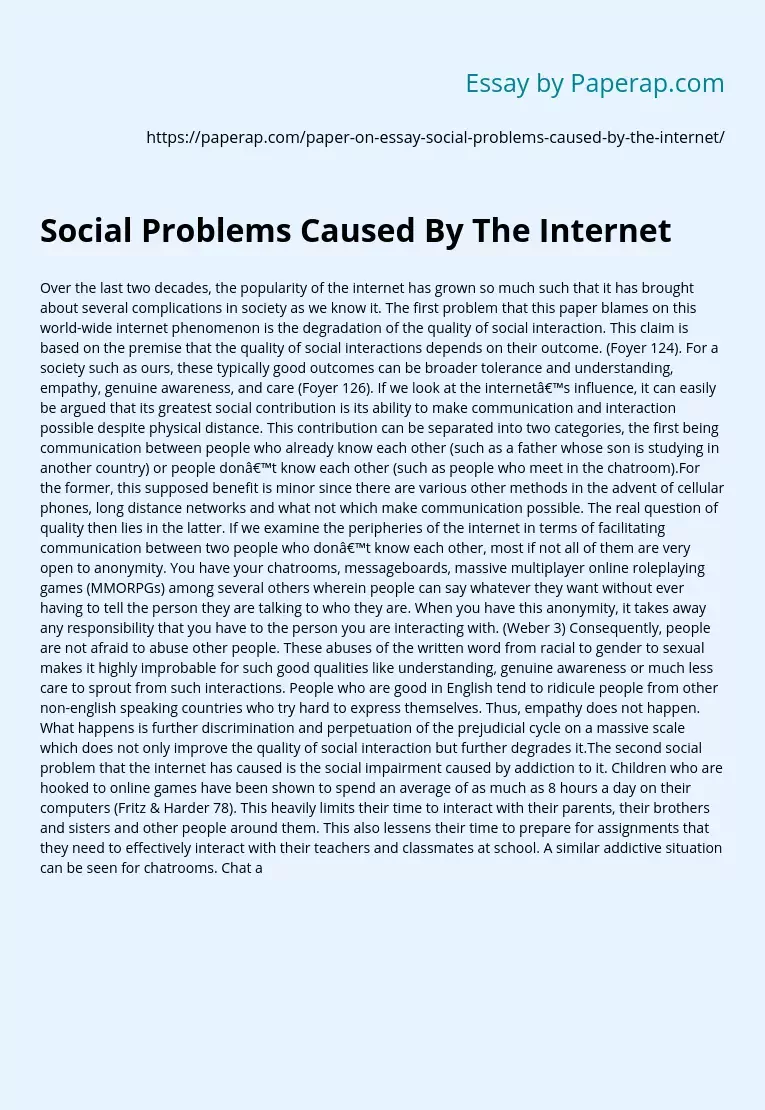Social Problems Caused By The Internet
Over the last two decades, the popularity of the internet has grown so much such that it has brought about several complications in society as we know it. The first problem that this paper blames on this world-wide internet phenomenon is the degradation of the quality of social interaction. This claim is based on the premise that the quality of social interactions depends on their outcome. (Foyer 124). For a society such as ours, these typically good outcomes can be broader tolerance and understanding, empathy, genuine awareness, and care (Foyer 126).
If we look at the internet’s influence, it can easily be argued that its greatest social contribution is its ability to make communication and interaction possible despite physical distance. This contribution can be separated into two categories, the first being communication between people who already know each other (such as a father whose son is studying in another country) or people don’t know each other (such as people who meet in the chatroom).
For the former, this supposed benefit is minor since there are various other methods in the advent of cellular phones, long distance networks and what not which make communication possible. The real question of quality then lies in the latter. If we examine the peripheries of the internet in terms of facilitating communication between two people who don’t know each other, most if not all of them are very open to anonymity. You have your chatrooms, messageboards, massive multiplayer online roleplaying games (MMORPGs) among several others wherein people can say whatever they want without ever having to tell the person they are talking to who they are.
When you have this anonymity, it takes away any responsibility that you have to the person you are interacting with. (Weber 3) Consequently, people are not afraid to abuse other people. These abuses of the written word from racial to gender to sexual makes it highly improbable for such good qualities like understanding, genuine awareness or much less care to sprout from such interactions. People who are good in English tend to ridicule people from other non-english speaking countries who try hard to express themselves. Thus, empathy does not happen. What happens is further discrimination and perpetuation of the prejudicial cycle on a massive scale which does not only improve the quality of social interaction but further degrades it.The second social problem that the internet has caused is the social impairment caused by addiction to it. Children who are hooked to online games have been shown to spend an average of as much as 8 hours a day on their computers (Fritz & Harder 78). This heavily limits their time to interact with their parents, their brothers and sisters and other people around them. This also lessens their time to prepare for assignments that they need to effectively interact with their teachers and classmates at school. A similar addictive situation can be seen for chatrooms. Chat addiction to date has seen people spending an average of 6.5 hours a day chatting (Fritz & Harder 64). But aside from the basic detriment of addiction that was already mentioned, chatrooms are also know as dangerous venues where minors are greatly vulnerable to sexual perverts. (Harper 21). The harm caused to victims of these crimes sometimes leaves them as traumatized as rape victims and even worse, sometimes it leads to them actually becoming victims of rape.The internet can be used for good. Its potential for a vast source of information is incredible. However, social problems have arisen due to its inherent nature. It is our task as concerned citizens of society to advocate the proper use of this revolutionary technology, not to mention use it properly ourselves.
Social Problems Caused By The Internet. (2019, Dec 05). Retrieved from https://paperap.com/paper-on-essay-social-problems-caused-by-the-internet/

